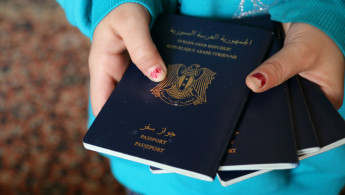Syrian passport applicants face exorbitant prices and risk of arrest
Syrian passport applicants face exorbitant prices and risk of arrest
Syrians attempting to obtain a passport from regime authorities are facing exorbitant prices and risk of arrest.
5 min read
The Syrian passport is ranked the fourth worst passport in the world [Getty]
The Syrian regime is using the issuance of passports as a way to finance its war on the Syrian people and to humiliate dissidents, according to a report released by the The Syrian Human Rights Network.
The report documents violations against Syrian citizens attempting to obtain passports, revealing the exorbitantly high financial costs of doing so compared to all the other countries of the world. Applicants are also at risk of arrest while attempting to obtain a passport.
From the beginning of the popular uprising up to April 2015
when President Bashar al-Assad's regime responded with military force to the peaceful protests demanding democratic reforms, all passport applicants, whether inside or outside Syria, were required to obtain approval from branches of the regime's security departments, meaning that regime opponents were deprived of the opportunity to obtain passports.
However, despite this official stance, the regime also ran an unofficial mafia-style black market operation through which these citizens could obtain passports in return for huge payments of up to US $5,000 per person.
 |
The regime also ran an unofficial mafia-style black market operation through which these citizens could obtain passports in return for huge payments of up to US $5,000 per person |  |
"I decided to travel to Turkey, but the obstacle facing me was to get a passport without entering the Immigration and Passport building for fear of being taken from there to the reserve service, I contacted someone who had relations with immigration and passport officials, and he issued me a passport and handed it to me two weeks later for 600,000 Syrian pounds," he said.
Hussam added that to avoid conscription he first travelled to Idlib governorate and then to Turkey.
"It cost me about two million Syrian pounds to travel out of my country, and on my journey to Idlib, I was in a car with a driver who gave bribes to the military checkpoints so that we could pass through without my name being checked against the wanted lists."
According to SNHR's database records of cases of arrest and enforced disappearances, at least 1,249 persons, including eight children, and 138 women, were arrested between March 2011 and January 2019 while conducting transactions in the immigration and passport departments in several governorates across Syria.
Prominant cases include Jalal Zakariya, a resident of Jabla city, who was arrested by Syrian regime forces on Thursday, November 1, 2012, at the Immigration and Passport headquarters building in Latakia city.
Khaled Nasrullah, from Douma city in Damascus Suburbs governorate, was arrested by Syrian regime forces on Wednesday, May 1, 2013, at the Immigration and Passport headquarters building in the Rekn al Din area in Damascus city.
Khaled and Jalal's whereabouts remain unknown.
Since 2015 all Syrians inside and outside the country should be able to apply for passports without any discrimination between regime opponents or pro-regime citizens – albeit at a cost of between $300-$800 – one of the highest passport application fee for citizens in the world.
 |
One of the highest passport application fee for citizens in the world |  |
Musa Neirabiya, a construction worker from Homs city, entered Lebanon illegally in 2012, and tried, throughout his time in Lebanon, to obtain a passport from the Syrian embassy that would allow him to acquire official residence papers for Lebanon. After hearing about the 2015 law change, he went to the embassy, conducted the passport transaction, and paid the fees.
When he returned on the date given on the receipt issued to him, however, staff brusquely told him that his application had been rejected.
"Through a mediator, I got an appointment at the embassy to get a passport, and the broker took US $150. I started preparing the necessary documents, then I paid $300 for the passport inside the embassy and about $30 for additional costs during the transaction between fees, stamps and other stuff, and they told me to review them after 30 days," he said.
"When I returned on time, the staff member told me that my application had been rejected and asked me to return to Damascus to complete my passport issuance procedures."
The report also explains that the maximum period of validity allowed for passports held by opponents of the Syrian regime – those who are wanted by the regime's security services – is two years maximum, which limits visas and travelling time as Syrians attempt to reach and settle in safe countries.
 |
The Syrian regime has used the material income it obtained as a result of printing passports for substantial amounts of money in its war against its opponents, the Syrian people |  |
"However, the Syrian regime's request for a price of $800 for a passport hasn't seen any international condemnation, nor has there been any effective action by the international community to give the Syrian citizen an alternative to the blackmail of the Syrian regime or to pressure [the regime] to set a rational price like the rest of the world."
The report called on the international community to put pressure on the Syrian regime and its allies to reduce the price of a Syrian passport, adding that any attempt to rehabilitate the regime by restoring political or economic relations with is a clear and direct expression of support for a repressive dictatorship that exploits its citizens' most basic rights.
Follow us on Twitter: @The_NewArab



